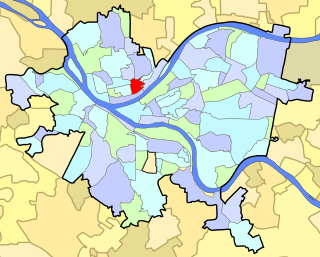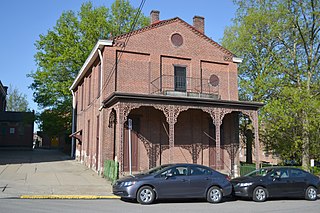
Millvale is a borough in Allegheny County, Pennsylvania, United States, along the Allegheny River, opposite Pittsburgh. The borough is located off Pennsylvania Route 28. The population was 3,376 at the 2020 census.

Allegheny City was a municipality that existed in the U.S. state of Pennsylvania from 1788 until it was annexed by Pittsburgh in 1907. It was located north across the Allegheny River from downtown Pittsburgh, with its southwest border formed by the Ohio River, and is known today as the North Side. The city's waterfront district, along the Allegheny and Ohio rivers, became Pittsburgh's North Shore neighborhood.

Maksimilijan "Maxo" Vanka was a Croatian-American artist. He is best known for the series of murals he completed in 1937 and 1941 at St. Nicholas Croatian Church in Millvale, Pennsylvania.

East Allegheny, also known as Deutschtown, is a neighborhood on Pittsburgh's North Side. It has a ZIP code of 15212, and has representation on Pittsburgh City Council by the council member for District 1. The Pittsburgh Bureau of Fire houses 32 engines and 32 trucks in Deutschtown.

Fineview — known to older generations as Nunnery Hill — is a neighborhood on Pittsburgh's North Side with expansive views of downtown Pittsburgh. The most famous of these views is from the Fineview Overlook at the corner of Catoma Street and Meadville Street.

Troy Hill is a neighborhood on Pittsburgh, Pennsylvania's North Side. It has a zip code of 15212, and has representation on Pittsburgh City Council by the council member for District 1.

The Basilica of the Immaculate Conception is a historic Catholic church in Downtown Jacksonville, Florida, U.S. A parish church in the Diocese of St. Augustine, it represents Jacksonville's oldest Catholic congregation. The current building, dating to 1910, was added to the U.S. National Register of Historic Places in 1992 as the Church of the Immaculate Conception, and was named a minor basilica in 2013. It is located at 121 East Duval Street; its current pastor is Father Jan Ligeza.

Immaculate Heart of Mary Church in Pittsburgh, referred to in Polish as Kościół Matki Boskiej, is a historic church of the Catholic Diocese of Pittsburgh. Located on Polish Hill in Pittsburgh, Pennsylvania, it is a prime example of the so-called 'Polish Cathedral' style of churches in both its opulence and grand scale. The church was designated a historic landmark by the Pittsburgh History and Landmarks Foundation in 1970.

St. John the Baptist Byzantine Catholic Cathedral is the mother church of Ruthenian Greek Catholic Church. It is located at 210 Greentree Road in Munhall, Pennsylvania, a suburb of Pittsburgh in the Monongahela River valley.

Walnut Hills United Presbyterian Church is a historic church tower in the Walnut Hills neighborhood of Cincinnati, Ohio, United States. The last remnant of a landmark church building, it was designed by a leading Cincinnati architect and built in the 1880s. Although named a historic site a century after its construction, the building was mostly destroyed after extensive neglect caused restoration to become prohibitively expensive.

Trinity Cathedral is an Episcopal Church in downtown Pittsburgh, Pennsylvania and is the cathedral for the Episcopal Diocese of Pittsburgh.

St. Nicholas Croatian Church is a Roman Catholic church in Millvale, Pennsylvania, US within the Diocese of Pittsburgh. It is listed on the National Register of Historic Places. It is noted for its murals by Maxo Vanka, painted in 1937 and 1941, such as Immigrant Mother Raises Her Sons for American Industry and The Capitalist. Time in 1937 described the murals as "one of the few distinguished sets of church murals in the U. S."

Church of St. Thomas the Apostle is a former Roman Catholic parish church in New York City that had been threatened with demolition. It was the subject of a landmarks preservation debate. The parish was established in 1889; staffed by the Salesians of Don Bosco from 1979 to 2003; and closed in 2003 because of a diminished congregation and structural problems.

Frederick C. Sauer was a German-American architect, particularly in the Pittsburgh, Pennsylvania, region of the late 19th and early 20th centuries.

The Saint Mary's Academy Building is a historic building in the Lawrenceville neighborhood of Pittsburgh, Pennsylvania. Built in 1854, it is a notable example of Greek Revival architecture and one of the neighborhood's only surviving buildings dating to the pre–Civil War era. It was the first structure built by St. Mary's parish, the first Catholic parish in Lawrenceville, and was originally used as both a church and school. In 1874, a new St. Mary's Church was built next door. St. Mary's merged with three other Lawrenceville parishes in 1993 to form the new Our Lady of Angels parish. The St. Mary church buildings remained in use for a few years but closed in 2004.

St. Thomas Aquinas Church is a historic church of the Roman Catholic Diocese of Columbus at 130 North. 5th Street in Zanesville, Ohio. The current church was completed in 1842, added to the National Register of Historic Places in 1980, and was under the care of the Order of Preachers until July 2017.

Saint John's Episcopal Church in Jersey City, New Jersey is a disused church of the Episcopal Diocese of Newark. Located on Summit Avenue in Bergen Hill, it is considered a masterwork of 19th-century ecclesiastical architecture. The building, which was named a municipal landmark in 2013, has not housed a congregation since 1994, and has fallen into disrepair. There are proposals to convert the buildings on the grounds to housing.

Holy Family Church is a historic former Roman Catholic church in the Lawrenceville neighborhood of Pittsburgh, Pennsylvania, and a contributing property in the Lawrenceville Historic District. The church was built in 1939–40 and was designed in the Romanesque Revival architectural style with modernist design principles.


















